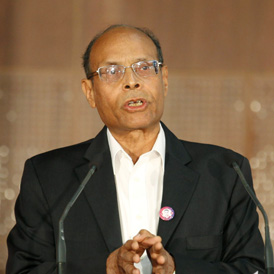Tunisia celebrates one year since Ben Ali
Tunisia is celebrating the first anniversary of the fall of Ben Ali, which sparked the Arab Spring and spread to the entire region. But with discontent still rife, where does Tunisia find itself now?

Tunisian president Moncef Marzouki and Prime Minister Hamadi Jebali will be joined by Algerian president Abdelaziz Bouteflika, Qatar emir Hamad bin Khalifa Al Thani, the head of Libya’s NTC Moustapha Abdeljalil and Morocco’s foreign minister to mark the official celebration.
But the celebrations do not mask continued discontent in Tunisia, as many of the issues that prompted protests against Ben Ali last year remain. Chief amongst them: unemployment.
And the spark that set off, fruit-seller Mohamed Bouazizi, who died after setting himself on fire in January, 2011 to protest harassment by officials in the government, remains a common occurance.
On Wednesday, a 46 year-old woman set herself on fire, and a week before that, 48-year-old Ammar Gharsalla died in similar circumstances, and again, a week before that, the same happened with a young man.
They were all thought to have been protesting against the region’s ongoing unemployment problem, which is around 30 per cent.
No wonder then, that Tunisian Finance Minister Houcine Dimassi this week implored the United States to implement conventions in the G8 to help the country recover financially.
The G8 had pledged to assist the country with a £3.3bn package to help it speed up infrastructure development, amongst other things.
Dimassi said the decline of fiscal revenues and with the country’s commitment to repay its public debt during 2012, is proliferating the strain on the public purse and, indeed, on the public’s patience.
And their impatience shows signs of boiling over.
Marzouki had to cut short a public address last week, such was the vitriol from the gathered crowd.
To add to the new embryonic government’s mounting problems, Amnesty International has claimed that it has yet to deliver the comprehensive human rights reform it had promised its people.
While it applauded the government for signing up to key human rights treaties and allowing greater freedom for media and human rights organisations, it said that the country’s security forces remained largely unaccountable.
“There have been some encouraging signals from the interim government in the direction of human rights reform,” said Hassiba Hadj Sahraoui, Amnesty International Middle East and North Africa Deputy Director. “But for many Tunisians the pace of change has been too slow.
“Until we see a new constitution that guarantees fundamental rights, accountability for abuses and the establishment of the rule of law it is too early to tell whether the political will for real human rights change is there.”
Nevertheless, there is much to be positive about, according to commentators on the ground like Tunis blogger Erik Churchill.
Tunisia may not have recovered financially, but it now a country where freedom of expression, the right to protest, improving relationships between police and people and a decrease in coercive corruption.
And according to judicial sources, the anniversary is expected to coincide with the government’s decision to grant parole to more than 5,000 detainees, a move sure to curry favour with human rights campaigners.
-
Latest news
-
Laughing Boy: New play tells the tragic tale of Connor Sparrowhawk5m

-
Sewage warning system allows some of worst test results to be left off rating system, analysis shows3m

-
Post Office inquiry: Former CEO didn’t like word “bugs” to refer to faulty IT system4m

-
Israeli soldier speaks out on war in Gaza12m

-
PM’s defence spending boost should be ‘celebrated’, says former Armed Forces Minister4m

-




